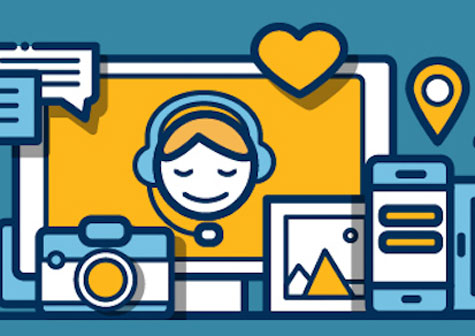When used intentionally, social media can be a useful tool. There are also many risks. Social media is designed to grab and keep your attention, which can put it in competition with your family, work, friends, nature, and the world itself.
Find out how to get the most out of social media to optimize your performance, mental health, and resilience. Read HPRC’s article on the impact of social media use too.

HOW TO USE SOCIAL MEDIA FOR BETTER PERFORMANCE, RESILIENCE & MENTAL HEALTH
People spend an average of 2 plus hours a day on social media. Find out how to maximize benefits and reduce risks.
The benefits include connection to others or new relationships, professional networking, sense of community through frequent moves and separations, entertainment, and information. There are dangers as well. Social media is designed to gain and keep your attention regardless of your goals or values. There’s also risk of depression, anxiety, isolation, loneliness, poor sleep, and other health problems. Overconsumption can lead to relationship conflicts and weakened communication skills. Other dangers include information that can mislead or cause extremist views and a threat to OPSEC.
Optimize your social media use! Be intentional. Name why you’re going on social media each time you log on to be more mindful of your goals. Turn off notifications so that you choose when to go online! Identify behaviors that signal your social media use is becoming problematic. Curate your feed to focus on what adds to your life and filter out the rest.
Set yourself up for success. Set timers or daily time limits on your phone. Try “when…then” strategies to avoid overconsumption such as “When I watch more than 3 videos in a row, then I’ll put my phone away.” Keep your phone in a different room while working, eating, spending time with others, or sleeping. Put apps in folders or delete them to make it harder to log on.
Beware of echo chambers. Algorithms rely on user activity to customize content and ads to keep you engaged, which can lead to inaccurate perceptions about others and the world. Diversify your media diet! Check multiple sources for information before forming an opinion. Make sure your posts are accurate and productive because they impact others’ view of you and the world.
Do a social media cleanse. Take an extended break until you notice your urge to use social media is gone. Set up a time with family, friends, or your unit when everyone stays off social media to be more present with each other.
Know the rules. Your online behavior can negatively impact your military career and put you at risk for disciplinary action. Always conduct yourself with honor and respect. Military families can protect Service Members by not sharing information that can impact OPSEC and mission success.
Conduct personal “social media” AARs. After using social media, ask yourself: how long did I hope to spend? How long did I actually spend? How did my time on social media impact my productivity, mood, and energy? How did it influence my beliefs? Finish these sentences. The world is. The future is. I’m. Those people are.
Is your social media use problematic? Click on the QR code to use HPRC’s Social Media Self-Check to find out!
Published on: April 19, 2022
References
Alimoradi, Z., Lin, C.-Y., Broström, A., Bülow, P. H., Bajalan, Z., Griffiths, M. D., . . . Pakpour, A. H. (2019). Internet addiction and sleep problems: A systematic review and meta-analysis. Sleep Medicine Reviews, 47, 51–61. doi:10.1016/j.smrv.2019.06.004
Anspach, N. M. (2017). The new personal influence: How our Facebook friends influence the news we read. Political Communication, 34(4), 590–606. doi:10.1080/10584609.2017.1316329
Dubois, E., & Blank, G. (2018). The echo chamber is overstated: The moderating effect of political interest and diverse media. Information, Communication & Society, 21(5), 729–745. doi:10.1080/1369118x.2018.1428656
Elphinston, R. A., & Noller, P. (2011). Time to face it! Facebook intrusion and the implications for romantic jealousy and relationship satisfaction. Cyberpsychology, Behavior, and Social Networking, 14(11), 631–635. doi:10.1089/cyber.2010.0318
Lin, C. Y., Namdar, P., Griffiths, M. D., & Pakpour, A. H. (2020). Mediated roles of generalized trust and perceived social support in the effects of problematic social media use on mental health: A cross‐sectional study. Health Expectations, 24(1), 165–173. doi:10.1111/hex.13169
Lu, W., & Hampton, K. N. (2016). Beyond the power of networks: Differentiating network structure from social media affordances for perceived social support. New Media & Society, 19(6), 861–879. doi:10.1177/1461444815621514
Przybylski, A. K., & Weinstein, N. (2017). A large-scale test of the goldilocks hypothesis. Psychological Science, 28(2), 204–215. doi:10.1177/0956797616678438
Zivnuska, S., Carlson, J. R., Carlson, D. S., Harris, R. B., & Harris, K. J. (2019). Social media addiction and social media reactions: The implications for job performance. The Journal of Social Psychology, 159(6), 746–760. doi:10.1080/00224545.2019.1578725





